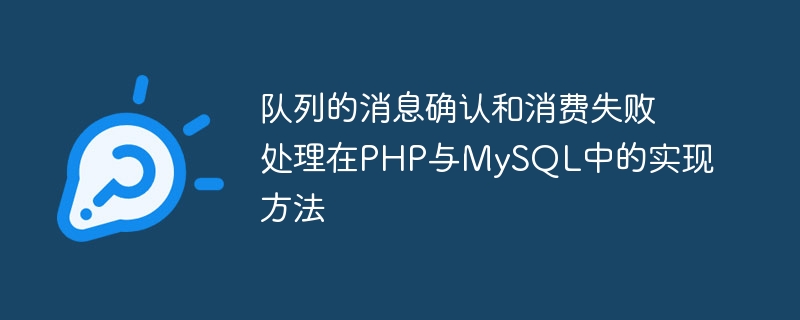

How to implement queue message confirmation and consumption failure processing in PHP and MySQL
Queue is a common message delivery mechanism, which can help solve problems in the system To solve high concurrency issues, asynchronous processing and decoupling are achieved. In the design of the queue, message confirmation and consumption failure handling are very important links. This article will explore how to use PHP and MySQL to implement queue message confirmation and consumption failure handling, and provide specific code examples.
In the queue, message confirmation means that after the consumer successfully processes the message, it sends a confirmation signal to the queue, indicating that the message has been successfully consumed. This way, the queue can mark the message as complete and clean up related resources. In PHP, you can use the MySQL database to implement the message confirmation function.
First, we need to create a queue table to store messages. The structure of the table can be as follows:
CREATE TABLE `queue` ( `id` int(11) NOT NULL AUTO_INCREMENT, `message` text NOT NULL, `status` tinyint(1) NOT NULL DEFAULT '0', PRIMARY KEY (`id`) ) ENGINE=InnoDB DEFAULT CHARSET=utf8;
Among them, id is the unique identifier of the message, message is the content of the message, status indicates the status of the message, 0 means unconfirmed, and 1 means confirmed.
Then, we can use the following code to implement the message confirmation function:
<?php
function confirmMessage($id) {
// 更新消息状态为已确认
$query = "UPDATE queue SET status = 1 WHERE id = :id";
$stmt = $pdo->prepare($query);
$stmt->bindParam(':id', $id, PDO::PARAM_INT);
$stmt->execute();
}
// 示例:确认消息ID为1的消息
confirmMessage(1);
?>By calling the confirmMessage function and passing in the message ID, the message status can be changed to confirmed.
In the queue, when the consumer is processing the message, exceptions or processing failures may occur. In order to ensure that messages are not lost, we need to implement a consumption failure handling mechanism. In PHP, you can use MySQL transactions to implement the consumption failure handling function.
First, we need to add a retry count field to the queue table to record the number of retries of the message. The structure of the table can be as follows:
ALTER TABLE `queue` ADD COLUMN `retry_count` int(11) NOT NULL DEFAULT '0' AFTER `status`;
Then, we can use the following code example to implement the consumption failure processing function:
<?php
function consumeMessage($id) {
// TODO: 处理消息的业务逻辑
// 事务开始
$pdo->beginTransaction();
// 更新消息状态为已消费
$query = "UPDATE queue SET status = 1 WHERE id = :id";
$stmt = $pdo->prepare($query);
$stmt->bindParam(':id', $id, PDO::PARAM_INT);
$stmt->execute();
// 提交事务
$pdo->commit();
}
// 示例:消费消息ID为1的消息
try {
consumeMessage(1);
} catch (Exception $e) {
// 发生异常时,进行消费失败处理
$pdo->rollBack(); // 回滚事务
$retryCount = getRetryCount(1); // 获取重试次数
if ($retryCount < 3) {
// 重试处理
retryConsume(1, $retryCount);
} else {
// 重试次数达到上限,进行其他处理(例如记录日志)
// ...
}
}
function getRetryCount($id) {
// 查询消息的重试次数
$query = "SELECT retry_count FROM queue WHERE id = :id";
$stmt = $pdo->prepare($query);
$stmt->bindParam(':id', $id, PDO::PARAM_INT);
$stmt->execute();
return $stmt->fetchColumn();
}
function retryConsume($id, $retryCount) {
// 更新消息重试次数
$query = "UPDATE queue SET retry_count = :retry_count WHERE id = :id";
$stmt = $pdo->prepare($query);
$stmt->bindParam(':id', $id, PDO::PARAM_INT);
$stmt->bindParam(':retry_count', $retryCount+1, PDO::PARAM_INT);
$stmt->execute();
// 重试消费
consumeMessage($id);
}
?>In the above code, retry processing will be performed when consumption fails, and Determine whether to perform the next round of retries based on the number of retries. When the number of retries reaches the upper limit, other processing can be performed based on the actual situation, such as logging.
This article introduces the method of using PHP and MySQL to implement queue message confirmation and consumption failure processing, and provides specific code examples. By understanding and applying these methods, we can use queues more efficiently and safely to handle message delivery in the system.
The above is the detailed content of How to implement queue message confirmation and consumption failure handling in PHP and MySQL. For more information, please follow other related articles on the PHP Chinese website!




